Eye Witness
Testimonies
Newspaper
Archives
Greek MFA
Telegrams
Political
Background
scroll down for english translation

FROM: Vice-Consul Benetatos, Bursa
TO: Greek MFA, Athens; Royal Greek Embassy, Istanbul
AFFECTED AREAS: District of Bursa (Kumköy, Gölyazı, Akpınar, Kirmasti)
Bursa, 1 (14) June 1914
I hereby report that today arrived, in a pitiful state, 30 inhabitants from the village of Kumköy, kaza Korma………. there’s more on the way. The village has been occupied by Muslim refugees, who ‘ve taken over the properties of the locals.
The village Aksepınar has been completely evacuated from its 100 families, the people fled to Appolonias. Masses of Ottoman Greeks are leaving Kirmasti and surrounding villages, persecuted by Turkish refugees.
[Benetatos]
scroll down for english translation

FROM: Consul General Kapsabèlis, Smyrna
TO: Greek MFA, Athens; Royal Greek Embassy, Istanbul
AFFECTED AREAS: Smyrna, Old Phocaea
Smyrna 1 (14) June 1914
The Metropolitan Bishop of Smyrna, together with local demogerontes (elected elders), met the just-arrived Minister of Internal Affairs, who confessed to Christian persecutions, adding that he wished to speak honestly. He has always been against the persecution of Christians, even if this damages the State. He shall remain here until the situation ameliorates and perpetrators be punished, those who won’t comply shall be sent to Yemen, if necessary the army shall be called to intervene. The Minister called upon the Metropolitan to travel to Old Phocaea. The Metropolitan’s impression is that the Minister is devastated by fear of the repercussions of the persecutions. He seemed apologetic.
[Kapsambelis]
scroll down for english translation

FROM: Governor General Sofoulis
Thessaloniki
TO: Head of the Council of Ministers, Athens
AFFECTED AREAS: Old Phocaea
Thessaloniki, 2 (15) June 1914
Very Urgent
To the Chairman of the Council of Ministers
3,000 refugees arrived today from Phocaea in Asia Minor; among them was the local bishop. According to their unanimous narration, last Friday at 8pm, Phocaea was surrounded and attacked by armed hordes who, together with the Turkish gendarmeries, started firing towards all directions. Houses and shops were lotted, the entire Greek population, including the priest, was forced out of their homes after having been robbed of all their money. Churches were raided and desecrated, not just by the security services but by the rest of the employees.
Elderly people and young children were slaughtered or thrown alive into wells. There’s more than one hundred dead. Most of the refuges who arrived here, especially older men and women, bear bruises from having been beaten up; others bear bayonet or gunshot wounds. Twenty critically injured by gunshots have been taken to local hospitals here. Most mourn lost children or other relatives.
After the catastrophe took place, the Hoca ascended on the church’s bell tower and prayed thanks for the destruction of the non-believers. The site of the refugees –desperate people still in a state of shock– has caused profound emotions throughout the city of Thessaloniki. In addition, two more steamers have come into port today, carrying refugees from Thrace.
The bishop of Phocaea has confided to me that the General Consul of Turkey, to whom he paid a visit, said he believes him and admitted the truth of what is being said –but finds the events were justified. The Turks, he said, are taking revenge for what happened in Macedonia and are securing their state because the Ottoman Greeks have been corrupted by teachers and priests …… danger. The bishops ins[ists] that this news shall not be communicated to my superiors.
Governor General
Sophoulis
scroll down for english translation

FROM: Governor General Petychakis, Mytilene
TO: Greek MFA, Athens
AFFECTED AREAS: Phocaea, Dikili, Çandarlı, Ayvalık, Yeniçarohori (Küçükköy)
Mytilene 2 (15) June 1914
Very Urgent
From refugees arriving today from Karaburun I am informed that the Turks there have barricaded themselves along with 20 cannons and a large number of soldiers.
2000 refugees arrived yesterday on Oinoussa island. Today, a charted steamer brought 5000 refugees from Phocaea, whose situation was so miserable that they could not be transported to Thessaloniki and had to alight in Eressos 4 days ago. Many were famished, and so were sick and wounded.
From Dikili arrived 2000 more, on a different steamer.
Hither came also two important men from Çandarli, one of which is a Russian, the other an Austrian citizen; they too had been forced out… They tell that in their area, the Turks, under the protection and the eyes of the Authorities, perpetrated unimaginable atrocities…
From the village Şakran 30 families left to go down to the coast. Only 7 people made it, the rest were killed.
In Kilisköy, the family of Christos Tsangkaris, all 8 of them, were slain, their infant killed by being dropped on vertically-planted long knives. From Ayvalık I have word that the village Yeniçeri Köyü, and even Ayvalık itself, are being threatened.
[Petychakis]
scroll down for english translation
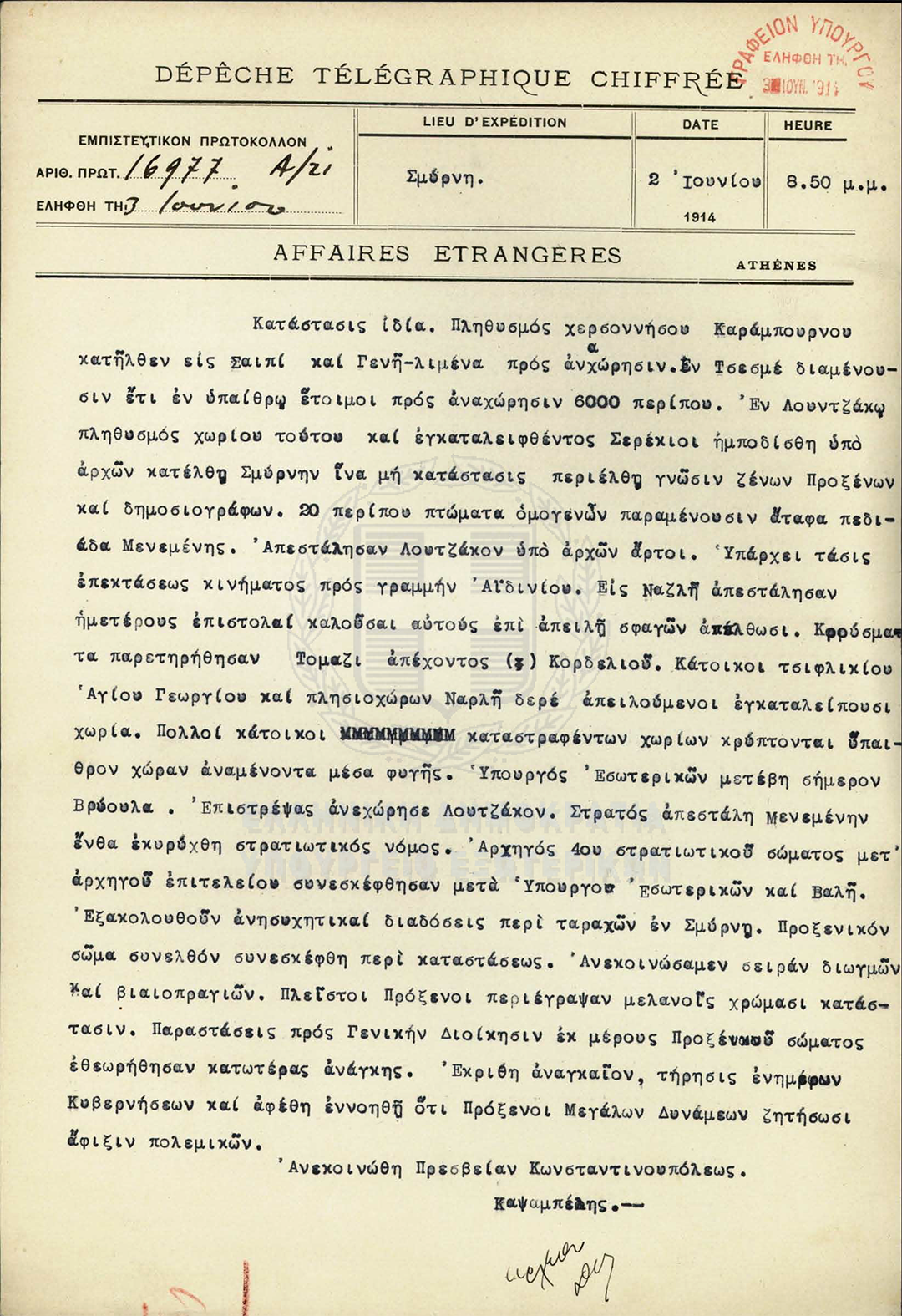
FROM: Consul General Kapsabèlis, Smyrna
TO: Greek MFA, Athens; Royal Greek Embassy, Istanbul
AFFECTED AREAS: Karaburun Peninsula (Çeşme etc.)
Smyrna 2 (15) June 1914
Situation unchanged. Population of Karaburun peninsula has descended to Saip and Yeniliman, ready to depart.
In Çeşme, more than 6000 people are sleeping rough, ready to depart.
The population of Ulucak and of Seyreköy, which was abandoned, was stopped from descending to Smyrna by the authorities so that they wouldn’t inform foreign consular authorities and journalists of what happened.
Around 20 dead bodies of Ottoman Greeks remain unburied in the Menemen plain. The authorities have sent bread to Ulucak.
The actions seem to be moving towards the Aydın borderline.
In Nazlı the Greeks were sent letters telling them to depart under threat of being slaughtered otherwise. Some were also seen in Tomazo, which is at a [short] distance from Kordelio [Karşıyaka].
The villagers of Ayia Yiorgi çiftliği and other villages near Narlı Dere, are abandoning their villages under threats. A lot of inhabitants from already destroyed villages hide in the countryside, waiting to flee.
The Minister of Internal Affairs visited Vourla (Urla) today. Then he returned and left for Ulucak.
The army was sent to Menemen, where martial law has been declared. The head of the 4th Army Corps, together with the chief of staff, have met with the Minister of Internal Affairs and the Valı.
Worrying rumours about riots in Smyrna still going around. The Consular Body met to discuss the situation. Formal announcement made on the persecutions and the acts of violence. Most foreign Consuls have described the situation in the gloomiest of colours.
They have deemed it necessary to keep their Governments informed and let it be implied that they requested the arrival of warships.
CC: Greek Embassy, Constantinople
[Kapsambelis]
scroll down for english translation
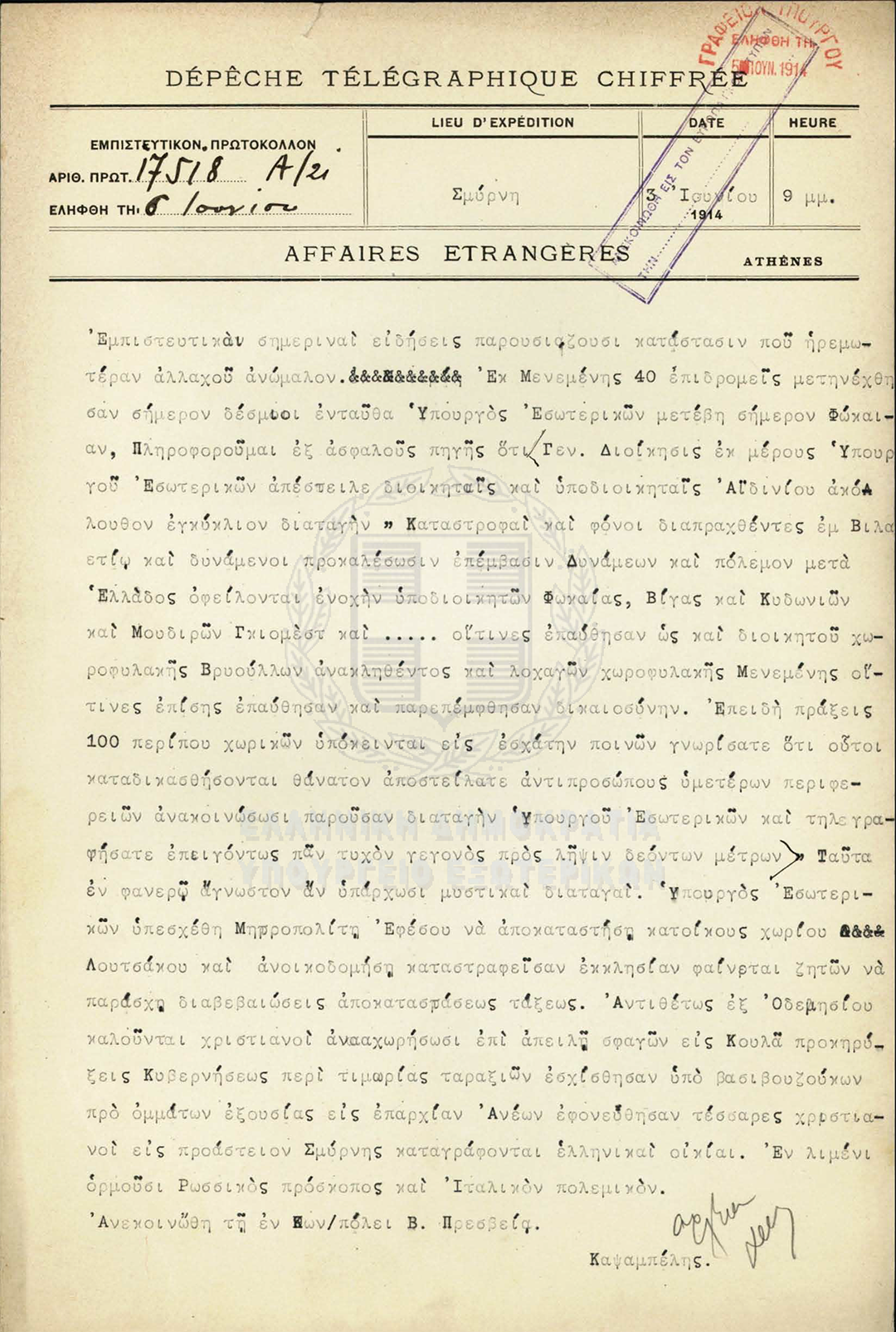
FROM: Consul General Kapsabèlis, Smyrna
TO: Greek MFA, Athens; Royal Greek Embassy, Istanbul
AFFECTED AREAS: Phocaea, Biga, Ayvalık, Gömeç, Ödemiş, Kula/Manisa, Aydın province (Söke etc.)
Smyrna, 3 (16) June 1914
Confidential news presents today a calmer, yet abnormal, situation. From Menemen, 40 looters have been brought here in shackles.
The Minister of Internal Affairs travelled today to Old Phocaea.
I have been informed, from a reliable source, that the General Administration has sent, on behalf of the Minister of Internal Affairs, the following order to the commanders and deputy commanders in the province of Aydın:
“All destruction and acts of murder perpetrated in the vilayet (province) which can potentially provoke the intervention of the Great Powers and a war with Greece, are attributable to the sub-commandants of Phocaea, of Viga, and of Ayvalık and the Müdürs of Gömeç and …., who have been relieved of their duties. Also to the commander of the gendarmerie of Urla –now recalled– and the captains of the Menemen gendarmerie, who have also been relieved of their duties and brought to justice.
Because the acts of about 100 villagers are liable to the largest of penalties, know that they shall be sentenced to death; announce the present order of the Minister of Internal Affairs to all representatives of your districts, and telegraph immediately in the case of any given event, so that appropriate measures shall be taken.”
This all happened in plain sight. Because it is impossible to know if there are secret orders.
The Minister of Interior has promised the Bishop of Efessos that the inhabitans of Ulucak shall be rehabilitated and their destroyed church shall be rebuilt. He seemed to be asking of reassurance of the restoration of order.
Oppositely, the Christians of Ödemiş are being asked to leave under threat of slaughter in Kula. Official government announcements for the punishment of perpetrators were torn in pieces by başıbozuk before the eyes of the Authorities. In the province of Anya, 4 Christians were killed. In the suburbs of Smyrna, Greek houses are being noted down. In the port, a Russian and an Italian warship dropped anchor.
CC: Royal Greek Embassy, Constantinople
[Kapsambelis]
scroll down for english translation

FROM: Vice-Consul Panagopoulos, Manisa
TO: Greek MFA, Athens; Royal Greek Embassy, Istanbul
AFFECTED AREAS: Province of Manisa
Manisa, 5 (18) June 1914
This morning, in the village Mütevelli, near Manisa, an Ottoman Greek was found slain by a long knife and shot by a Martini rifle. The previous night, after having been robbed by police officers, a peaceful Ottoman Greek was deadly wounded.
Ottoman refugees are wreaking havoc unimpeded throughout the countryside, and so no Rum dares go to their fields to work, despite the assurances offered by the Authorities. If there were no ban on Ottoman Greeks leaving, all would leave, fearing future massacres.
CC: Royal Greek Embassy, Constantinople
[Panagopoulos]
scroll down for english translation
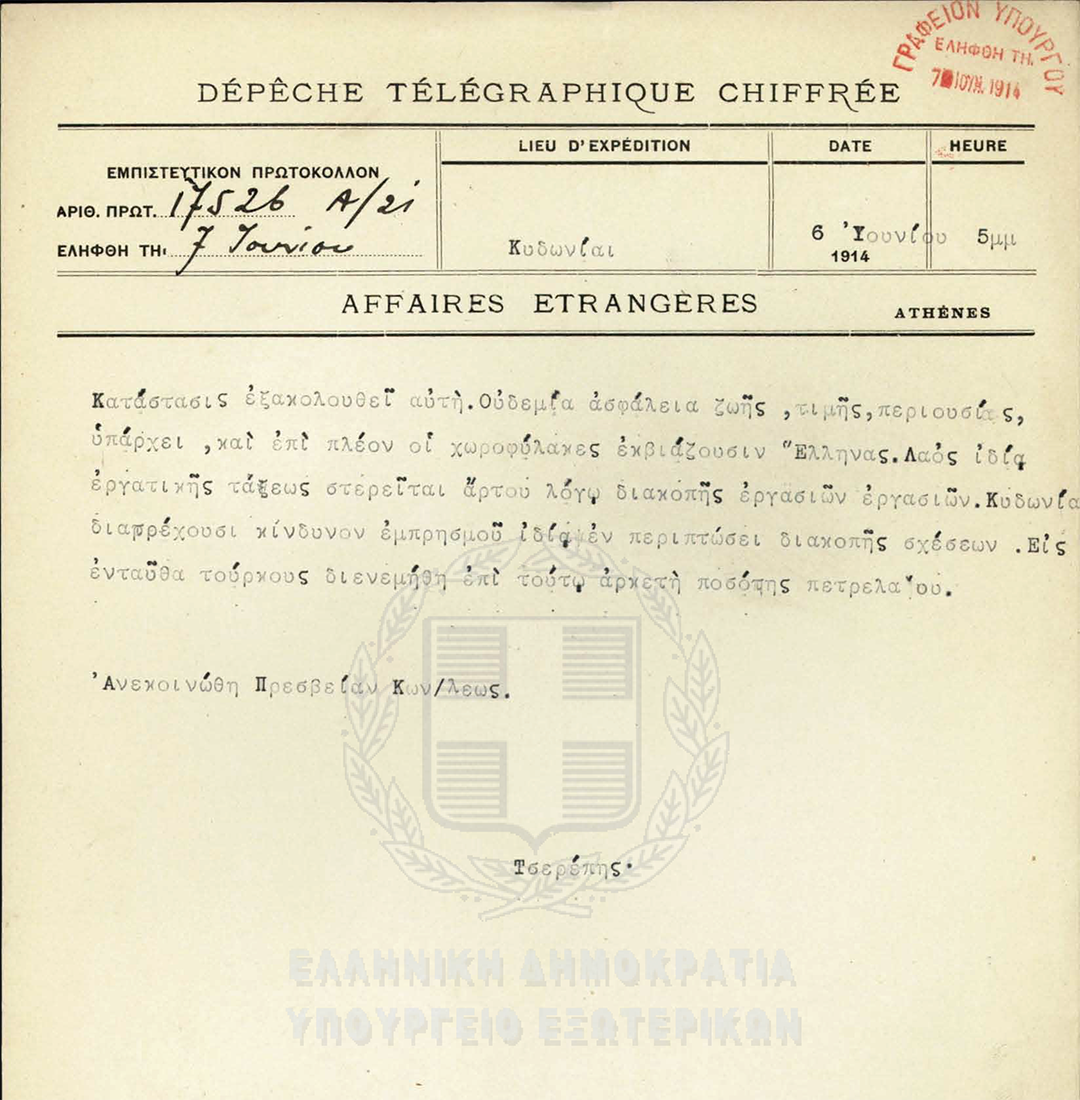
FROM: Vice-Consul Tserèpis, Ayvalık
TO: Greek MFA, Athens; Royal Greek Embassy, Istanbul
AFFECTED AREAS: Ayvalık
Ayvalık, 6 (19) June 1914
Situation remains unchanged.
There is no security for life, honour, or property. In addition, the gendarmes are blackmailing Greeks.
The people, especially those of the working class, are deprived of bread because there is no one working. Ayvalık is in imminent danger of being burnt down, if there’s complete rapture of relations. A sufficient amount of petrol has been distributed to the local Turks in case things come to this.
CC: Greek Embassy, Constantinople
[Tserepis]
scroll down for english translation

FROM: Vice-Consul Yiannès, Vurla
TO: Greek MFA, Athens
AFFECTED AREAS: Vurla (Urla)
Vurla, 7 (20) June 1914
07:35 am
I have received reliable information that tonight or tomorrow an inevitable general massacre will befall the Christian population of Urla, with the help of the Army; it’s been decided that the Consulate shall be the first to be raised to the ground. Please send steamers for the women and children today and take all necessary measures to save a population of 40 thousand… information most positively checked.
[Yiannès]
scroll down for english translation

FROM: Vice-Consul Benetatos, Bursa
TO: Greek MFA, Athens
AFFECTED AREAS: Mudanya, Tiriliye (Zeytinbağı), Syge (Kumyaka), Başköy, Yalıçiftlik, Ainati (İkizce)
Bursa, 7 (20) June 1914
I hereby report that, up until today, 11,000 refugees have fled to Mudanya, Trilye, and Siğe [Kumyaka]. I have sent, by post, the verified names of 14 villages which have been occupied and looted by Mohammedans; churches have been raided in Aynati [Ikizce] and Başköy, and women have been abducted in Yalıçiftlik. Only a few villages who put up a fight with weapons were spared being looted.
I have confidential information that a lot of refugees have been gathering in Bandırma.
They keep coming, all in a pitiful state. I have been in contact with the rest of the Consulates so that we may officially notify all Embassies to send a committee made up of members of the Consular Corps to corroborate the events.
[Benetatos]
scroll down for english translation
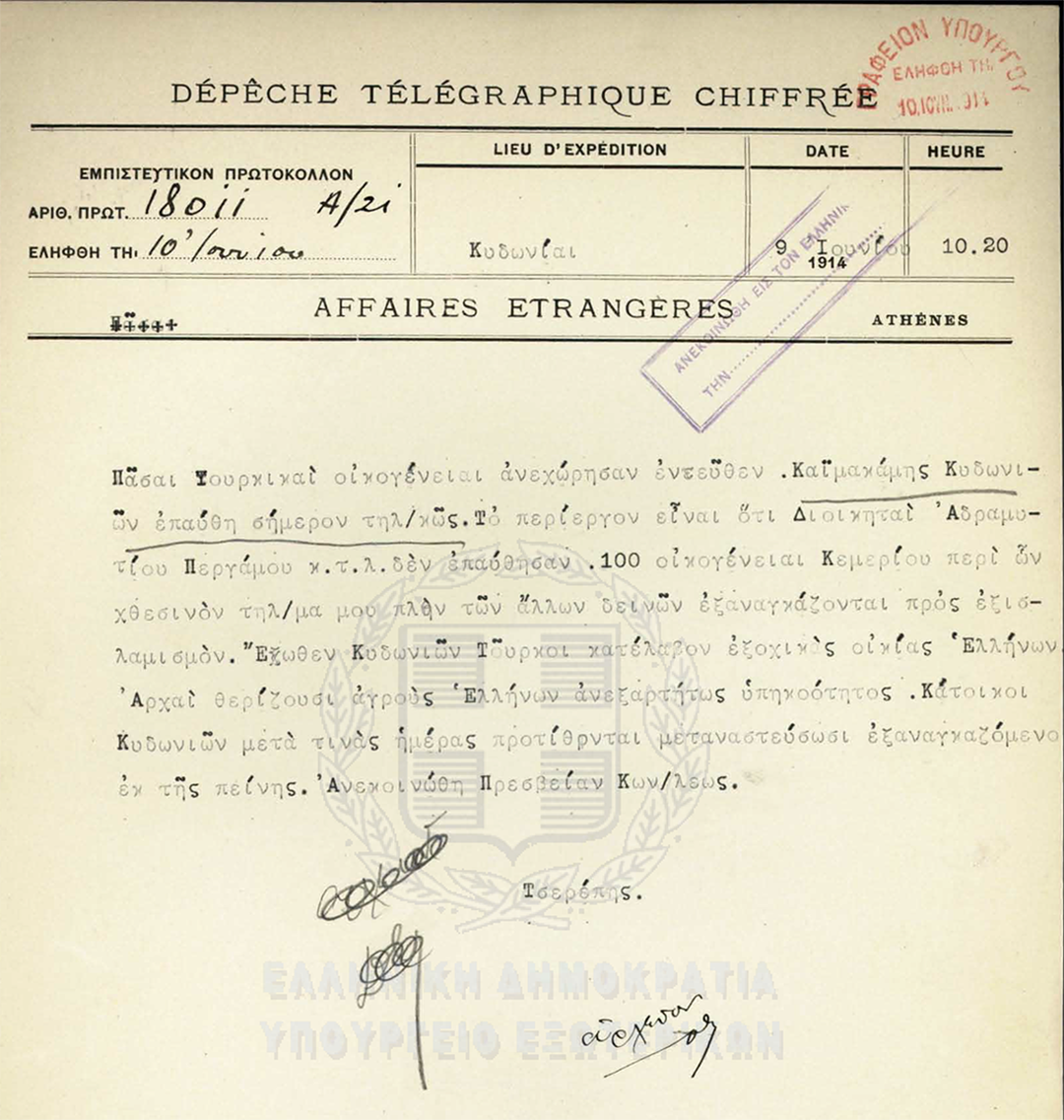
FROM: Vice-Consul Tserèpis, Ayvalık
TO: Greek MFA, Athens; Royal Greek Embassy, Istanbul
AFFECTED AREAS: Ayvalık, Edremit, Bergama, Kemer (Burhaniye)
Ayvalık, 9 (22) June 1914
All Turkish families have left the city.
The kaymakam [governor] of Ayvalık has been relieved of his duties via telegram.
The peculiar thing is that the governors of Edremit, Bergama, etc. have not.
100 families from Kemeri [Burhaniye], of which I spoke in my yesterday’s telegram, have been forced to convert to Islam, on top of other harassment.
Outside Ayvalık the Turks have taken over the summer houses of the Greeks and the Authorities are scouring through the fields of Greeks, no matter what their actual citizenship is. After all these days, the inhabitants of Ayvalık are thinking of emigrating, due to extreme hunger.
CC: Greek Embassy, Constantinople
[Tserepis]
scroll down for english translation

FROM: Vice-Consul Yiannès, Vurla
TO: Greek MFA, Athens
AFFECTED AREAS: Entire province of Vurla (Urla)
Vurla, 9 (22) June 1914
Regarding my telegram concerning the massacres, I hereby declare that the evening before yesterday the local Authorities received an urgent telegram…… immediately, in all Turkish villages, by which even the minutest act of violent was strictly forbidden from the night before yesterday onwards.
I am assuming this comes as a consequence of the protests made by the Russian Consul and the Metropolitans, to the Minister of Internal Affairs, initiated by yours truly the day before yesterday.
[Yiannès]
scroll down for english translation

FROM: Ambassador Panàs, Smyrna
TO: Greek MFA, Athens
AFFECTED AREAS: Aydın province (Muğla, Denizli)
Smyrna, 13 (26) June 1914
I hasten to disclose to you the following telegram, which I addressed to the Royal Embassy in Constantinople:
“Please take the following telegram to the Patriarch’s home:
I confidentially announce to You that the situation is getting worse. Following the arrival of Talaat Bey, the formerly quiet province of Heliopolis [Aydın] was thrust into commotion, the commercial embargo extended, hunger and terrorism reign in all provinces, properties are being destroyed, the Christians are in despair. We urge you not to decide to lift the Church’s defensive measures until we can assure you of the real condition of our Christians.
The Metropolitan Bishops of Efessos [Efes], Smyrna [Izmir], Philadelphia [Alaşehir], Krini [Çeşme], Heliopolis [Aydın].”
[Panas]
scroll down for english translation
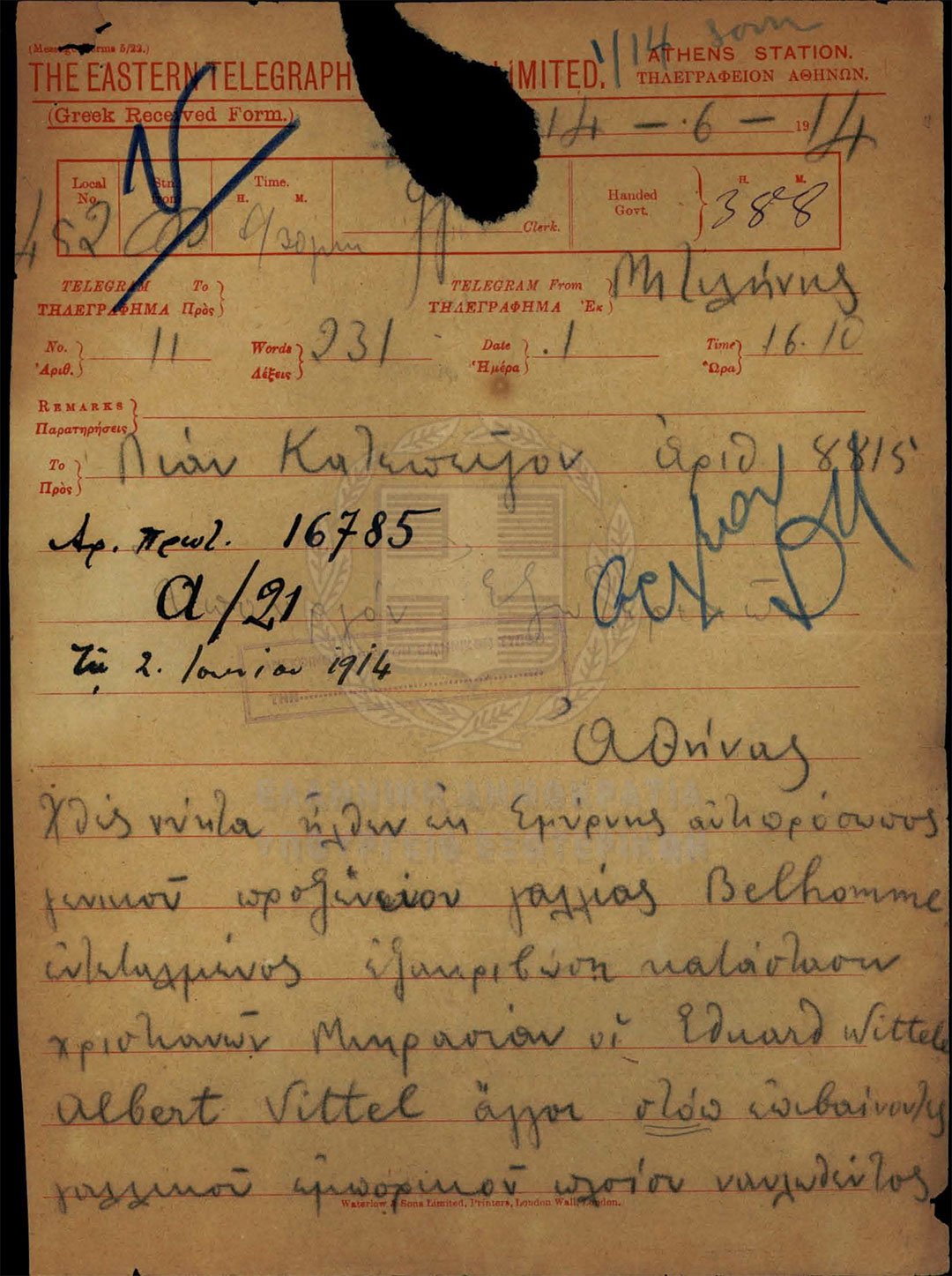
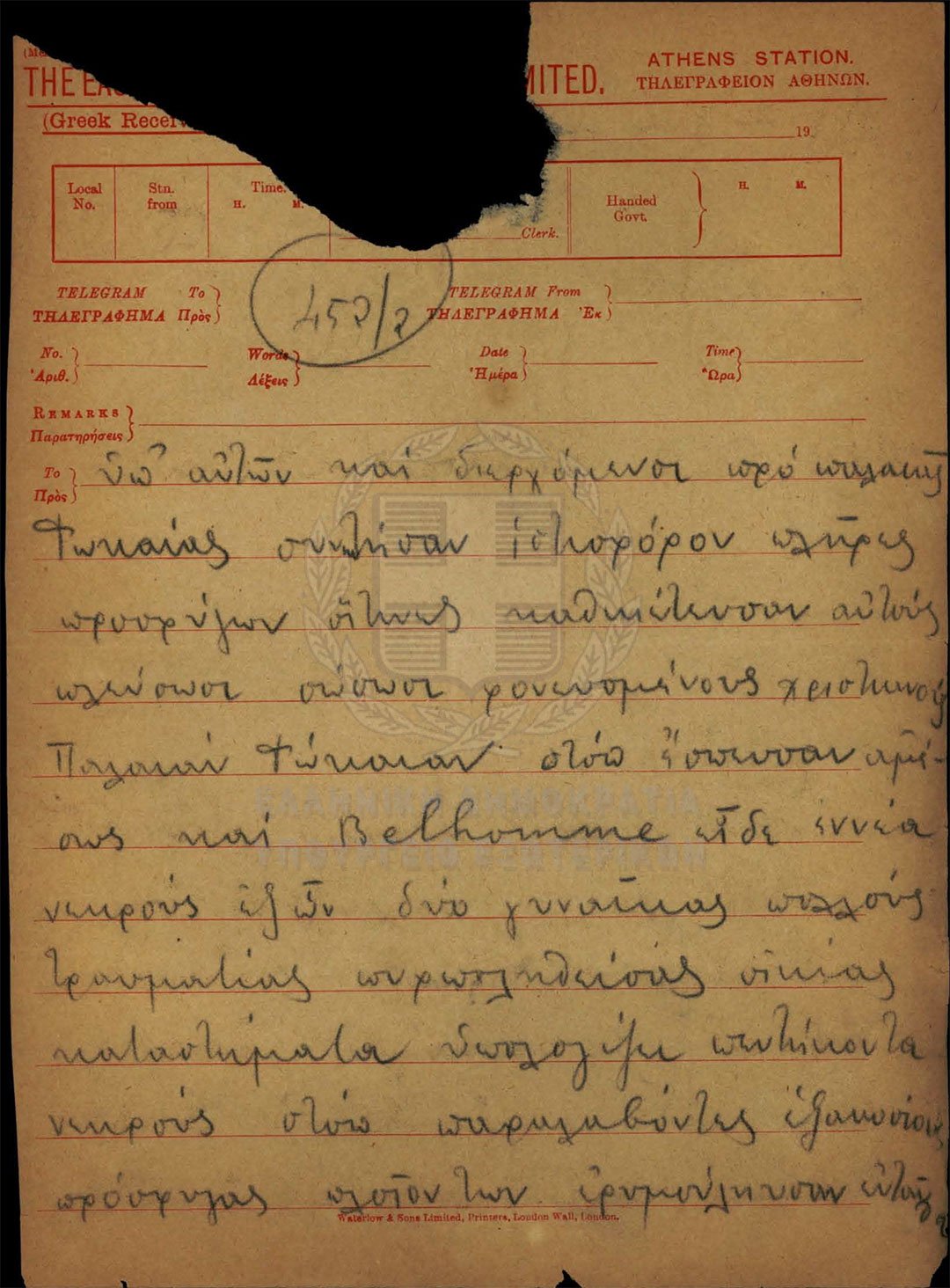
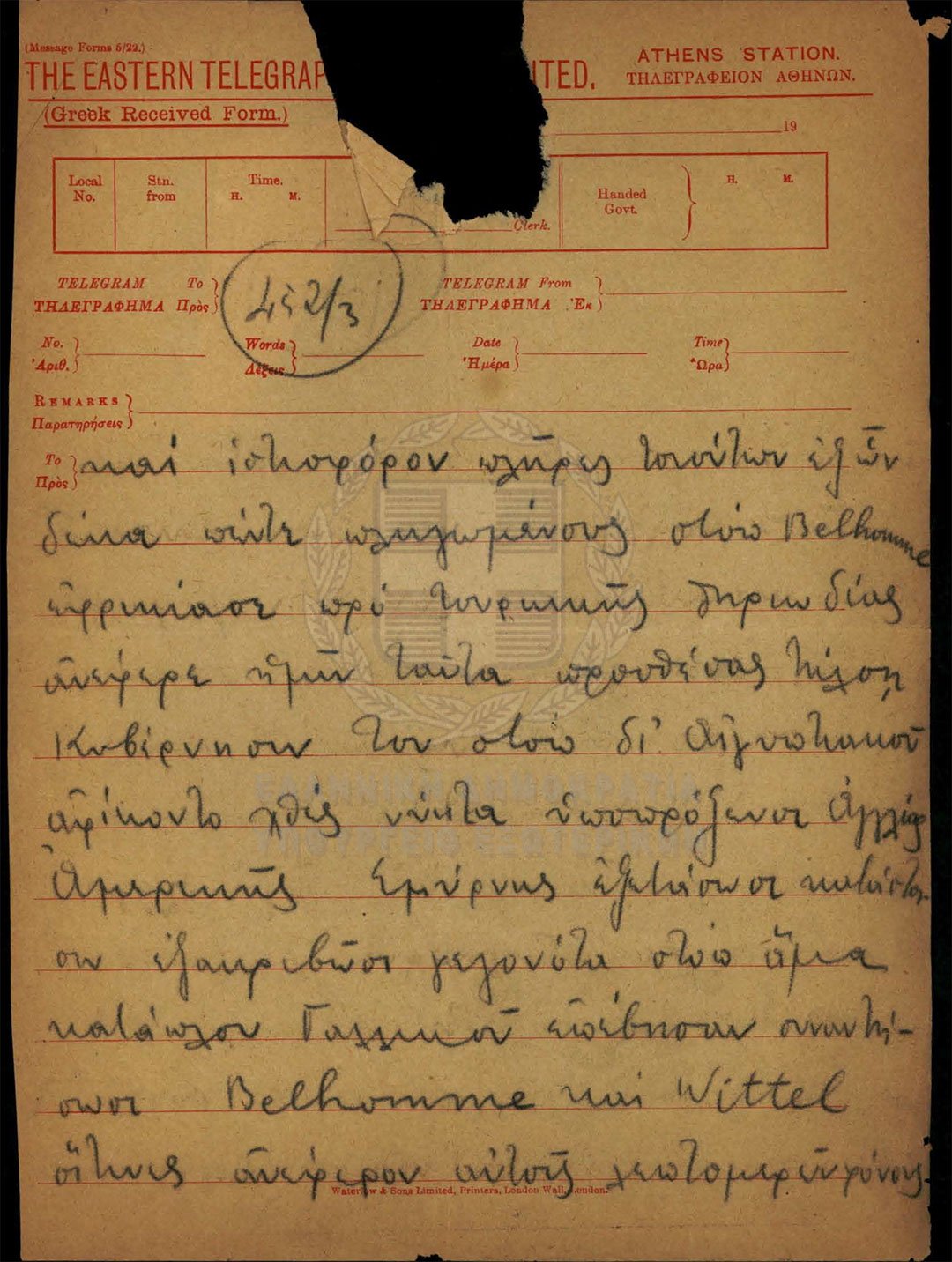

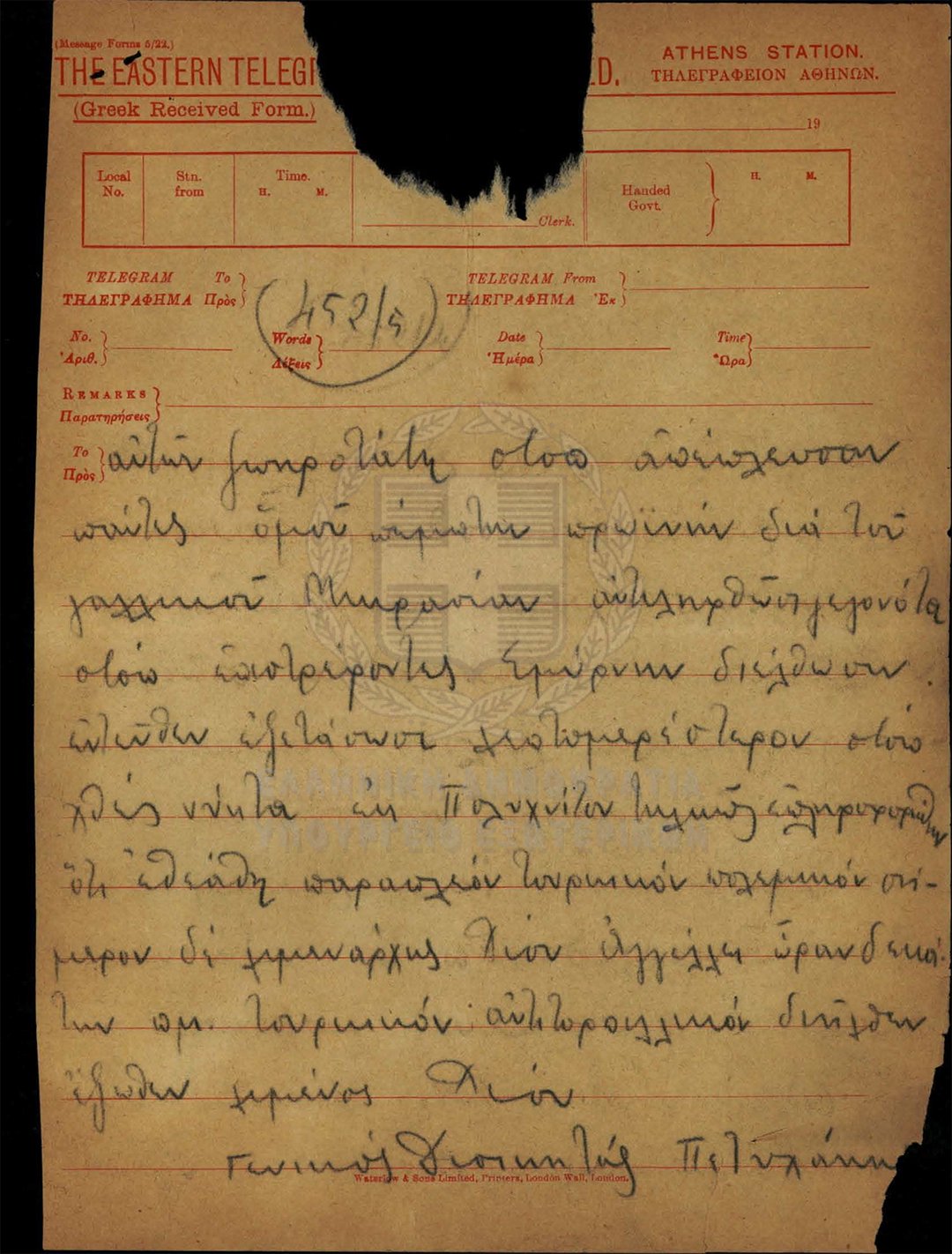
FROM: Governor General Petychakis, Molyvos (Lesbos)
TO: Greek MFA, Athens
AFFECTED AREAS: Old Phocaea
TELEGRAM
14 (27) June 1914
Mytilene
Time: 16:10
Very Urgent
To: Athens
Last night, a representative from the French Consulate General arrived in Smyrna, M. Belhomme, instructed to verify the situation of Christians in Asia Minor. Also Messrs Edward Whittal, Albert Vitel, and others. STOP
The passengers of a French merchant ship chartered by them, as they were passing in from of Old Phocaea, were met by a yawl filled with refugees who begged the former to go into the Old Phocaea port to save the Christians who were being slain. STOP
They immediately did and M. Belhomme saw nine dead, two of which were women, a lot of wounded, burnt-down houses and shops. He calculated that the dead reach up to fifty. STOP.
They received six hundred refugees on board and towed behind them a sailboat filled with refugees, fifteen of which were injured. STOP
Belhomme was horrified before these Turkish atrocities, he said so to us, and added he would be telegraphing his own government. STOP
The Deputy Consuls of England and America arrived yesterday in Smyrna by Egyptian boat, to examine the situation and verify the events. STOP
Once the French ship had returned, the Deputy Consuls met with Belhomme and Whittal, who reported in detail the killings, the injuries, and the looting in Old Phocaea. The Consuls kept notes and expressed a desire to travel to Phocaea to apprehend the situation themselves. STOP
Here, they visited churches and schools filled with refugees, they visited the hospital, they saw the wounded and the dead bodies of two children killed by gunshot from the coast as they were fleeing last night on a boat, they kept detailed notes, their impressions were very vivid. STOP
Everyone embarked on the French ship at 5 o’clock in the morning to visit and verify the events STOP
Returning to Smyrna they came by here to cross-check the events more thoroughly. STOP
Last night in Polichnitos I was told by telephone that they saw nearby a Turkish warship. And today, the harbourmaster of Chios island has announced that, at 10am, a Turkish destroyer passed outside the port of Chios.
Governor General Petychakis
Τηλεγράφημα
14-6-1914
Σταθμός Μυτιλήνης
Ώρα 16.10
Λίαν Κατεπείγον
Αθήνας
Χθες νύκτα ήλθεν εις Σμύρνη αντιπρόσωπος γενικού προξενείου Γαλλίας Μπελόμ εντεταλμένος εξακριβώσει κατάστασιν Χριστιανών Μικρασίαν, οι Έντουαρντ Γουίταλ, Αλμπέρ Βιτέλ, άλλοι ΣΤΟΠ
Επιβαίνοντες γαλλικού εμπορικού πλοίου ναυλωθέντος υπ’ αυτών και διερχόμενοι προ Παλαιάς Φωκαίας συναντήσαν ιστιοφόρον πλήρες προσφύγων οίτινες καθικέτευσαν αυτούς πλεύσωσι σώσωσι φονευομένους Χριστιανούς Παλαιάν Φωκαίαν ΣΤΟΠ
Έσπευσαν αμέσως και Μπελόμ είδε εννέα νεκρούς εξ ών δύο γυναίκας, πολλούς τραυματίας, πυρποληθείσας οικίας, καταστήματα. Υπολογίζει πεντήκοντα νεκρούς ΣΤΟΠ
Παραλαμβάνοντες εξακοσίους πρόσφυγας πλοίον των, ερυμούλκυσαν ενταύθα και ιστιοφόρον πλήρες τοιούτων, εξ ών δεκαπέντε πληγωμένους ΣΤΟΠ
Μπελόμ εφρικίασε προ τουρκικής θηριωδίας, ανέφερε ημών ταύτα, προσθέσας τηλεγραφήσει Κυβέρνησήν του ΣΤΟΠ
Δι’ Αιγυπτικού αφίκοντο χθες νύκτα υποπρόξενοι Αγγλίας, Αμερικής, Σμύρνη, εξετάσωσι κατάστασιν, εξακριβώσι γεγονότα ΣΤΟΠ
Άμα κατάπλου Γαλλικού επέβησαν συναντήσωσι Μπελόμ και Γουίταλ, οίτινες ανέφερον αυτοίς λεπτομερώς φόνους, τραυματισμούς, λεηλασίας Παλαιάς Φωκαίας. Έλαβον σημειώσεις, εξεδήλωσαν επιθυμίαν περιέλθωσι πόλιν, αντιληφθώσι κατάστασιν ΣΤΟΠ
Περιήλθον εκκλησίας, σχολάς πλήρεις προσφύγων, μετάβησαν νοσοκομείον, είδον τραυματίας και δύο πτώματα παίδων φονευθέντων εκ πυροβολισμών ριφθέντων εις παραλίας Μικρασίας επί πλοίου ού επέβαινον χθες νύκτα φεύγοντες, κράτησαν λεπτομερείς σημειώσεις, εντύπωσις αυτών ζωηροτάτη ΣΤΟΠ
Απέπλευσαν πάντες ομού πέμπτην πρωϊνήν διά του γαλλικού Μικρασίαν, αντιληφθώσει γεγονότα ΣΤΟΠ
Επιστρέφοντες Σμύρνην διέλθωσιν εντεύθεν εξετάσωσι λεπτομερέστερον ΣΤΟΠ
Χθες νύχτα εις Πολυχνίτου, τηλεφωνικώς επληροφορήθην ότι εθεάθη παραπλέον τουρκικόν πολεμικόν. Σήμερον δε λιμενάρχης Χίου αγγέλει ώραν δεκάτην προ μεσημβρίας τουρκικόν αντιτορπιλικό διήλθεν έξωθεν λιμένος Χίου
Γενικός Διοικητής Πετυχάκης
scroll down for english translation
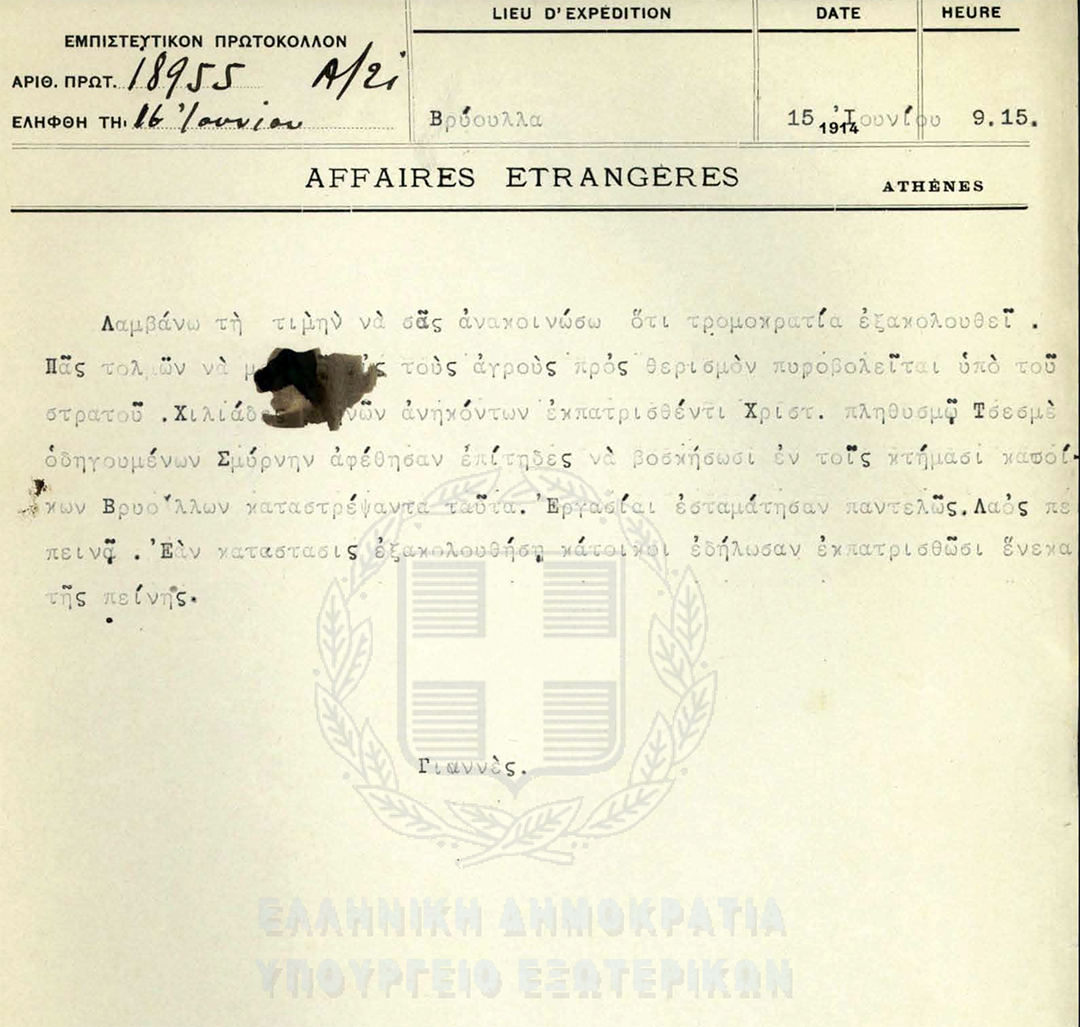
FROM: Vice-Consul Yiannès, Vurla
TO: Greek MFA, Athens
AFFECTED AREAS: Urla, Çeşme
Vurla, 15 (28) June 1914
Ι hereby honourably report that the terrorisation continues. Anyone who dares remain in the fields to harvest is shot by the Army. Thousands of sheep belonging to the fleeing Christian population of Çeşme, as they were being transported to Smyrna, were left deliberately to graze in the fields of the Vurla inhabitants, completely destroying them. All work has stopped. The people are hungry. If this situation continues, the inhabitants have declared they will emigrate due to hunger.
[Yiannès]
scroll down for english translation

FROM: Consul General Kapsabèlis
Smyrna
TO: Greek MFA, Athens; Royal Greek Embassy, Istanbul
AFFECTED AREAS: Old Phocaea, Yayaköy, Buca/İzmir, Nazlı
TELEGRAM
Smyrna
16 (29) June 1914
As I telegraphed before, Interpreters, accompanied by the inspector from the Ministry of Internal Affars, Şükrü Bey, the French archaeologist Félix Sartiaux, the correspondents for the Times of London and Hamburg News, and the priest, visited Old and New Phocaeas yesterday. Despite the Authorities’ most diligent efforts to cover up traces of the persecution, the impressions they were left with were vivid.
In Old Phocaea an argument took place between Şükrü Bey and Sartiaux, when the first suggested that the population had left voluntarily and the latter corroborated the persecutions, lootings, and raids. The German Interpreter appeared also to become angry at the Authorities’ attempts to conceal the facts. The priest is convinced that the Interpreters have become fully aware of the situation, and has commended the conduct of M. Sartiaux.
All this was also confirmed by the Russian Interpreter, who visited the Metropolitan Bishop of Smyrna today, recommending that the Metropolitan should suggest to the refugees to return to their villages. Tomorrow, the Interpreters shall be visiting Tire and Ödemiş.
The American Embassy’s aviso came into the Smyrna port two days ago. Today, an Italian warship left. The Valı left today for Bergama in order to –I have been informed– help with the settlement of Mohammedan refugees (muhacirs).
Yesterday, they 15th, the following events took place:
Attempted murders of Konstantinos Kavoukas and Kyriakos Ambelas, in Yayaköy. Dimitrios Dikis and …[….] were attacked and injured near Buca. A woman was attacked, killed, and her home was burgled in Sultanhisar. An Ottoman Greek’s coffee shop was looted in Nazlı. Blockade continues. Evacuation of the village of Tiraili, as a result of savage threats.
CC: Embassy, Constantinople
Kapsambelis
scroll down for english translation

FROM: Vice-Consul Tserèpis, Ayvalık
TO: Greek MFA, Athens; Royal Greek Embassy, Istanbul
AFFECTED AREAS: Kabakum/Dikili, Smyrna, Ayvalık
Ayvalık, 16 (29) June 1914
Turkish refugees have taken residence also in Kabakum, occupying Greek homes. Greek estates are being distributed to the occupiers for harvesting by the Authorities, for a pittance. Half of the proceeds shall go to the Turkish state, in reality to the Turkish navy; the other half will be collected and returned to the occupiers. Most of the stolen animals have been confiscated and have been taken to Smyrna; others to Ereğli. From all this, it is obvious that the plan fort he extermination of Hellenism continues frictionlessly and systematically.
Despite my efforts to get a hold of some photographs of dead bodies for the press office, I was not able to do so as the Authorities hasten to bury them outside the city.
CC: Royal Greek Embassy, Constantinople
[Tserepis]
scroll down for english translation

FROM: Vice-Consul Yiannès, Vurla
TO: Greek MFA, Athens; Royal Greek Embassy, Istanbul
AFFECTED AREAS: Karaburun peninsula
Vurla, 16 (29) June 1914
6:50pm
At this very moment, weapons are being distributed to the Turkish residents of all surrounding villages, who have been summoned by telephone to receive them here.
CC: Royal Greek Embassy, Constantinople
[Yiannès]
scroll down for english translation
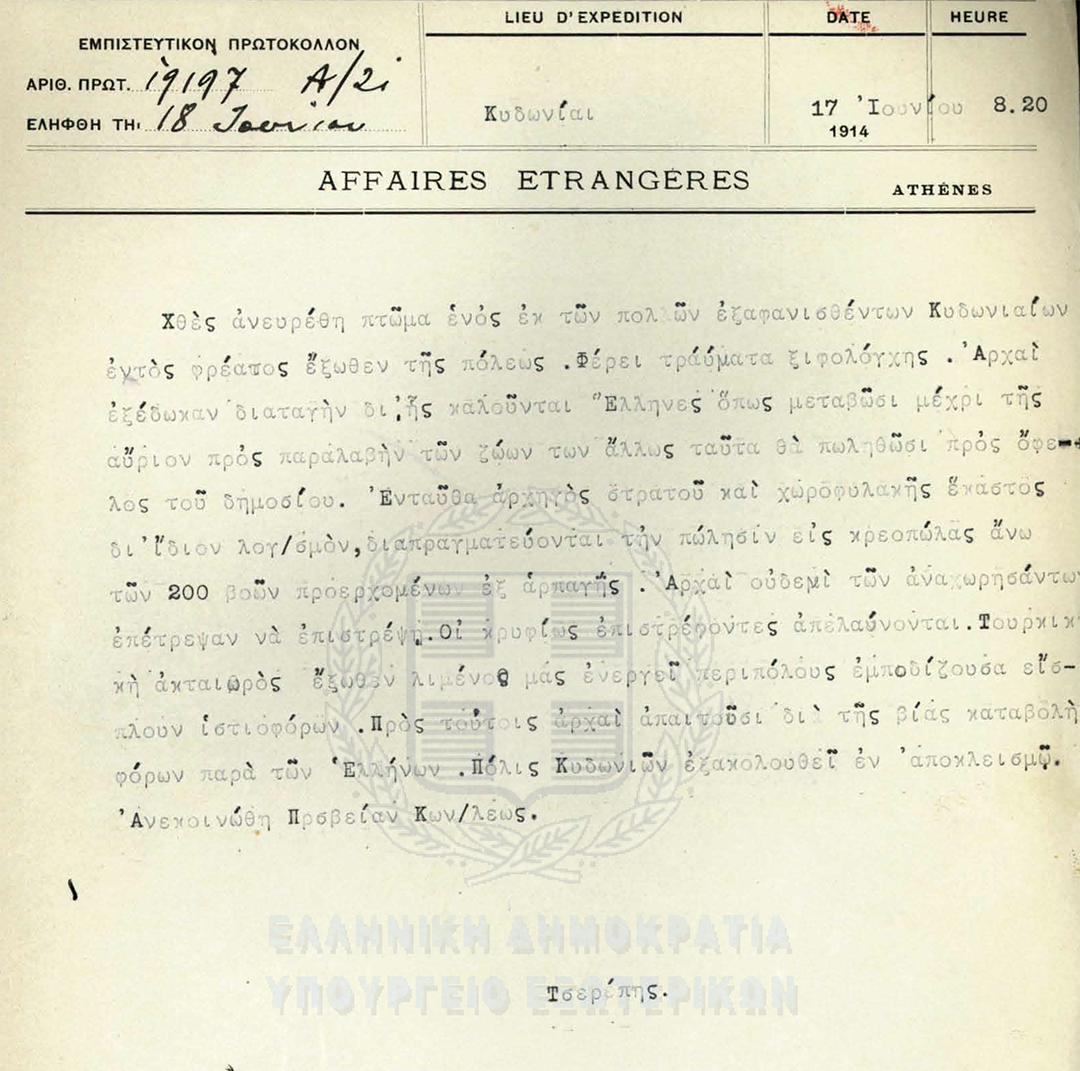
FROM: Vice-Consul Tserèpis, Ayvalık
TO: Greek MFA, Athens; Royal Greek Embassy, Istanbul
AFFECTED AREAS: Ayvalık
Ayvalık, 17 (30) June 1914
Α body was found yesterday, belonging to one of the missing Ayvalık residents. It had been thrown into a well outside the city. It bears bayonet wounds. The Authorities have issued an order according to which they call for Greeks to show up by tomorrow in order to receive back their animals, otherwise they shall be sold in favour of the State. The local army chief and the local gendarmerie commanders, each on his own account, have been negotiating the sale of more than 200 bulls, all stolen, to local butchers.
The Authorities are stopping anyone who is trying to come back.
Those who come back in secret are caught and deported.
A Turkish coastguard vessel is patrolling outside our port, preventing all sail boats from entering the harbour. The Authorities demand of the Greeks to pay tax if they want the boats to come through.
The city of Ayvalık remains under blockade.
CC: Greek Embassy, Constantinople
[Tserepis]
scroll down for english translation
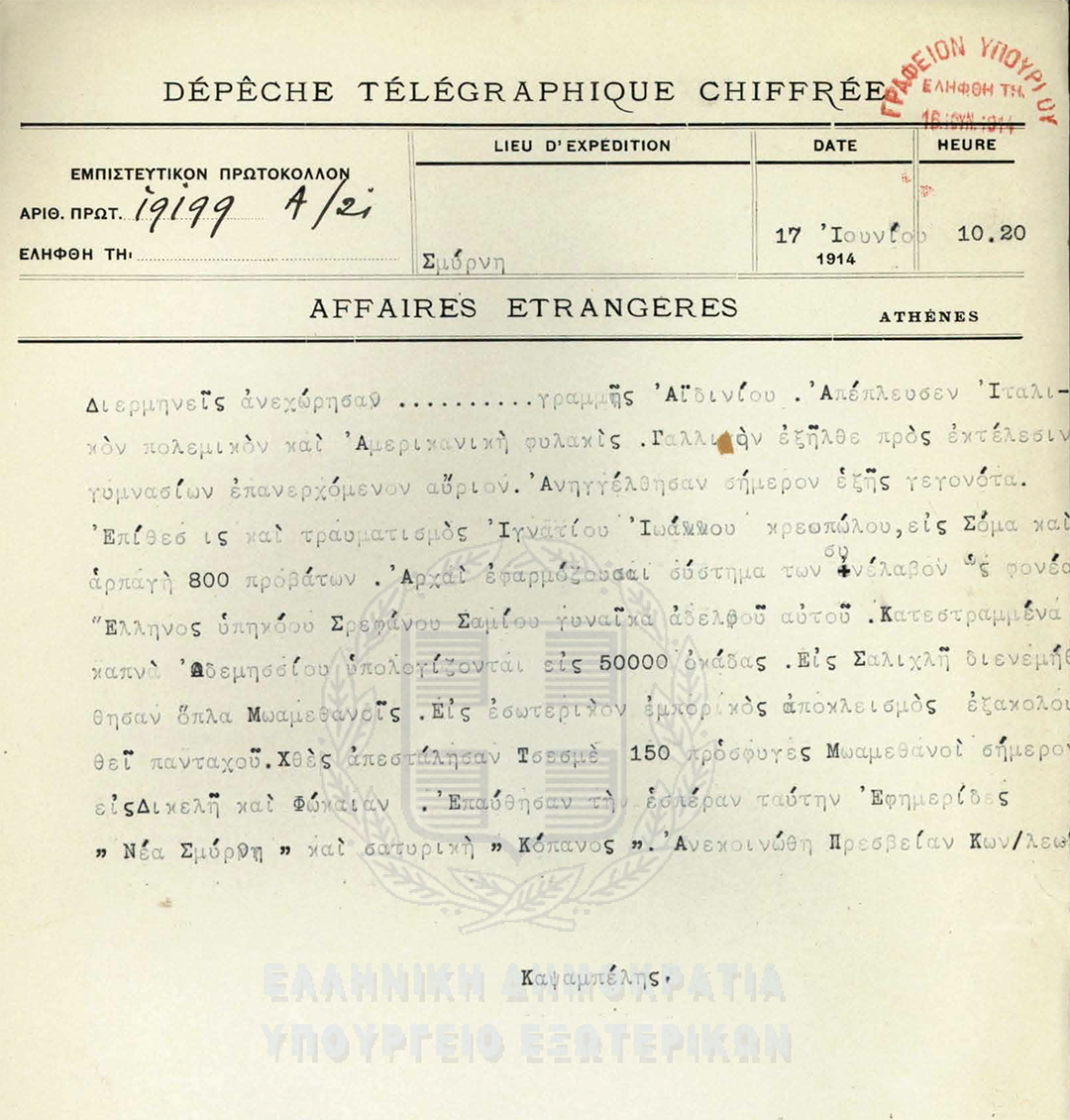
FROM: Consul General Kapsabèlis, Smyrna
TO: Greek MFA, Athens; Royal Greek Embassy, Istanbul
AFFECTED AREAS: Aydın, Dikeli, Soma, Phocaea, Salıhlı, Çeşme, İzmir
Smyrna, 17 (30) June 1914
Interpreters left on the …………… of the Aydın line. An Italian warship and an American aviso have sailed away. A French steamer has also left the harbour for training; it will be returning tomorrow.
The following events were announced today:
Ignatios Ioannou, a butcher from Soma, has been attacked and wounded, and 800 sheep have been stolen.
The authorities, applying their well-tried practices, have accused for the killing of Greek citizen Stefanos Samios, his brother’s wife.
The ruined tobacco produce of Ödemiş is estimaded at 50,000 okka [65,000 kilos].
In Salıhlı, weapons were distributed to the Muslims.
In the interior, the economic blockade still continues everywhere.
Yesterday 150 muhacirs (Muslim refugees) were sent to Çeşme. Today to Dikili and Foça.
The newspaper “Nea Smyrni” and the satirical paper “Kopanos” have been banned as of this evening.
CC: Greek Embassy, Constantinople
[Kapsambelis]
scroll down for english translation


FROM: Governor General Petychakis, Molyvos (Lesbos)
TO: Greek MFA, Athens
AFFECTED AREAS: Old Phocaea
Telegram
20 June (3 July) 1914
Mytilene
To: Ministry of Foreign Affairs, Athens
French archaeologist Sartiaux arrived last night from Old Phocaea, having saved nine hundred local Christians, protecting everyone STOP
He telegraphed Paris twice today, one to Salomevaeinath [?] the other to another Sartiaux, describing the persecution, adding that the killings are continuing, characterising the Turkish official declaration as completely false, adding that Turkey will only stop in the face of armed violence, and that there is indisputable evidence for the guilt of the Turkish government. He also pleads the recipients to make his telegrams known immediately to the French Ministry of Foreign Affairs.
Governor General Petychakis
Τηλεγράφημα
20 Ιουνίου (3 Ιουλίου) 1914
Μυτιλήνη
Υπουργείον Εξωτερικών, Αθήναις
Αφίκετο χθες εσπέρας εκ Παλαιάς Φωκαίας Γάλλος αρχαιολόγος Σαρτιώ διασώσας εννιακοσίους αυτόθι Χριστιανούς, προστατεύσας πάντας ΣΤΟΠ
Δις ετηλεγράφησε σήμερον Παρισίους προς Salomevaeinath (?) και τινα Σαρτιώ, περιγράψας διωγμόν, προσθέσας σφαγαί εξακολουθούσι, χαρακτηρήσας Τουρκικόν ανακοινωθέν τελείως ψευδές και ότι Τουρκία υποχωρήση μόνον προ ενόπλου βίας, ότι υπάρχουσιν αναμφισβήτηται αποδείξεις ενοχής τουρκικής κυβερνήσεως, παρακαλεί δε αυτούς ανακοινώσωσι πάρα τα ταύτα Υπουργείον Εξωτερικόν Γαλλίας.
scroll down for english translation

FROM: Vice-Consul Tserèpis, Ayvalık
TO: Greek MFA, Athens; Royal Greek Embassy, Istanbul
AFFECTED AREAS: Entire coast of Asia Minor
Ayvalık, 21 June (4 July) 1914
I am reliably informed that, by means of coded telegram, the Sublime Porte has ordered the local administration to make sure that all evidence of havoc and looting shall be covered up, because of the imminent arrival of the Consular Interpreters’ Committee.
CC: Royal Greek Embassy, Constantinople
[Tserepis]
scroll down for english translation


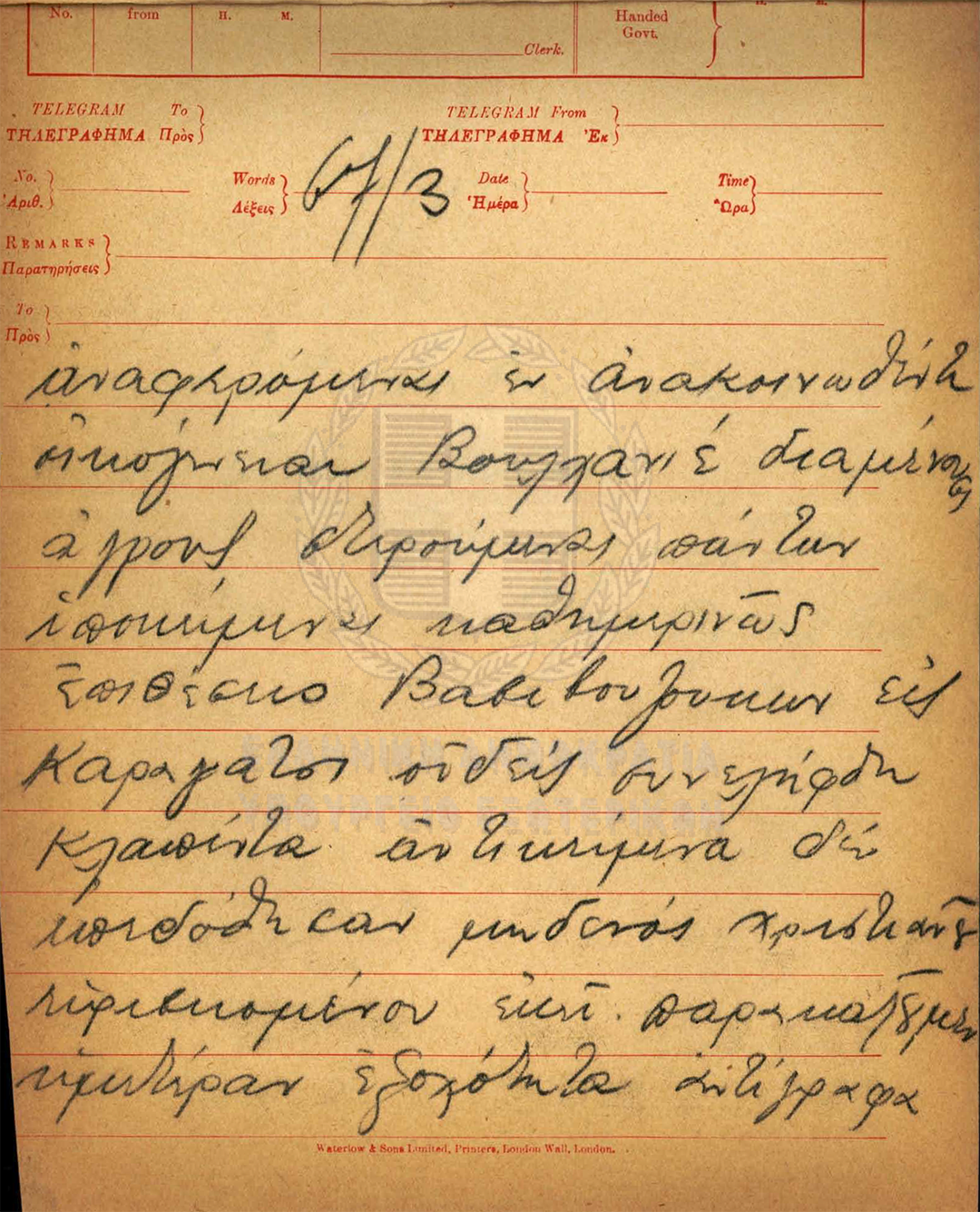

FROM: Governor General Petychakis, Molyvos (Lesbos)
TO: Greek MFA, Athens
AFFECTED AREAS: Edremit, Akçay
TELEGRAM FROM MOLYVOS (LESVOS ISLAND)
Time: 15:30
21 June (4 July) 1914
Stamped, for the Minister of Foreign Affairs, Athens
We categorically refute the statement made by the Turkish Embassy.
The Christians of Edremit and surrounding areas did not emigrate willingly; they were expelled by the Turkish authorities. Their mobile possessions were stolen by the Kaymakam of Edremit, by the Chief Constable of Akçay, the Commander of the Gendermerie and Mayor Hakki, in whose house Talaat lodged.
On the day of Talaat’s arrival in Edremit, ten thousand refugees were waiting for a steamer on the beach in Akçay. The Supreme Minister saw to it that they were quickly deported by a Turkish steamer.
A Muslim man was wounded by another Muslim man, as they were quarrelling over the distribution of booty.
The families from Burhaniye mentioned in the Announcement are living in the fields, deprived of everything, and subjected to daily attacks by başıbozuk. In Karaağaç no one has been arrested and no stolen goods have been returned to local Christians.
We plead, your Excellency, to hand over this telegram to the Press, to print.
30 thousand refugees.
ΤΗΛΕΓΡΑΦΗΜΑ εκ Μολύβου Λέσβου
Ώρα 15:30
21 Ιουνίου (4 Ιουλίου) 1914
Εχαρτοσημάνθη Υπουργόν των Εξωτερικών, Αθήνας
Διαψεύδομεν κατηγοριματικότατα ανακοινωθέν Τουρκικής Πρεσβείας.
Χριστιανοί Αδραμυττίου και περιχώρων δεν μετανάστευσαν, αλλ’ εξεδιώχθηκαν παρά Τουρκικών αρχών. Κινητά των διηρπάγησαν παρά Καϊμακάμη Αδραμυττίου, Αστυνόμου Ακτσάς, Αρχηγού Χωροφυλακής και δημάρχου Χακί, εις οίτινος οικίαν εφιλοξενήθη Ταλάατ. Ημέραν ερχομού Ταλάατ Αδραμυττίου, δέκα χιλιάδες πρόσφυγες ανέμενον ατμόπλοιον παραλίαν Ακτσάι, Υψηλοτάτου Υπουργού φροντίσαντος ταχίστην αυτών απέλασιν διά τουρκικών ατμοπλοίων.
Μουσουλμάνος ετραυματίσθη παρά Μουσουλμάνου φιλονικούντος διανομήν αρπαγέντων.
Αναφερόμεναι εν ανακοινωθέντι οικογένειαι Βουλχανιέ διαμένουσι αγρούς, στερούμεναι πάντων, υποκείμενας καθημερινώς επιθέσεις βασιβοζούκων. Εις Καραγάτσι ουδείς συνελήφθη, κλαπέντα αντικείμενα δεν επιδόθηκαν μηδενός Χριστιανού ευρισκομένου εκεί.
Παρακαλούμεν ημετέραν εξοχότητα αντίγραφα παρόντος δώση τύπον προς δημοσίευσιν.
30 χιλιάδες πρόσφυγες.
scroll down for english translation

FROM: Governor General Petychakis, Mytilene
TO: Greek MFA, Athens
AFFECTED AREAS: Edremit, Yenifoça
In Mytilene, 25 June [8 July] 1914
KINGDOM OF GREECE
GENERAL ADMINISTRATION OF THE AEGEAN ISLANDS
To the Ministry of Foreign Affairs
Complementing our 22 June telegram re: the arrival of Captain Boyle, the English Naval Attaché to Athens and Constantinople, we hereby report that a committee of Asia Minor inhabitants has come before him, presenting him with the details of the persecutions, the robberies, the kidnappings, in which even the official authorities took part –the Commander of the Gendarmerie and the Kaymakam included, themselves armed and threatening citizens hiding in their homes at night, demanding that they immediately hand over all available money and valuables. The members of the committee also handed Mr. Boyle a written protest, suggesting that he visits immediately –with the interpreters– all referenced places in order to verify the truth of their narration by cross-examining the events himself. Mr. Boyle kept detailed notes and promised to advocate with the English Ambassador in Athens that their proposal be accepted.
On this occasion, we deem productive to present here other events that have come to our attention these past few days, concerning the persecutions but also the general state of things.
Tasoula Marianou, from New Phocaea, escaped persecution by fleeing with her husband to the mountains. The next morning, however, because they were hungry, her husband was forced to go back to the town to bring some food. But the evening came and her husband had not come back, so she had to climb back down as well. As soon as she was home, she found her husband murdered. Another woman from the same town, despite being 80 years old, was beaten by the gendarmes and had her animals stolen. From a trusted letter correspondent, we learn that the Commander of the Gendarmerie [….]
scroll down for english translation
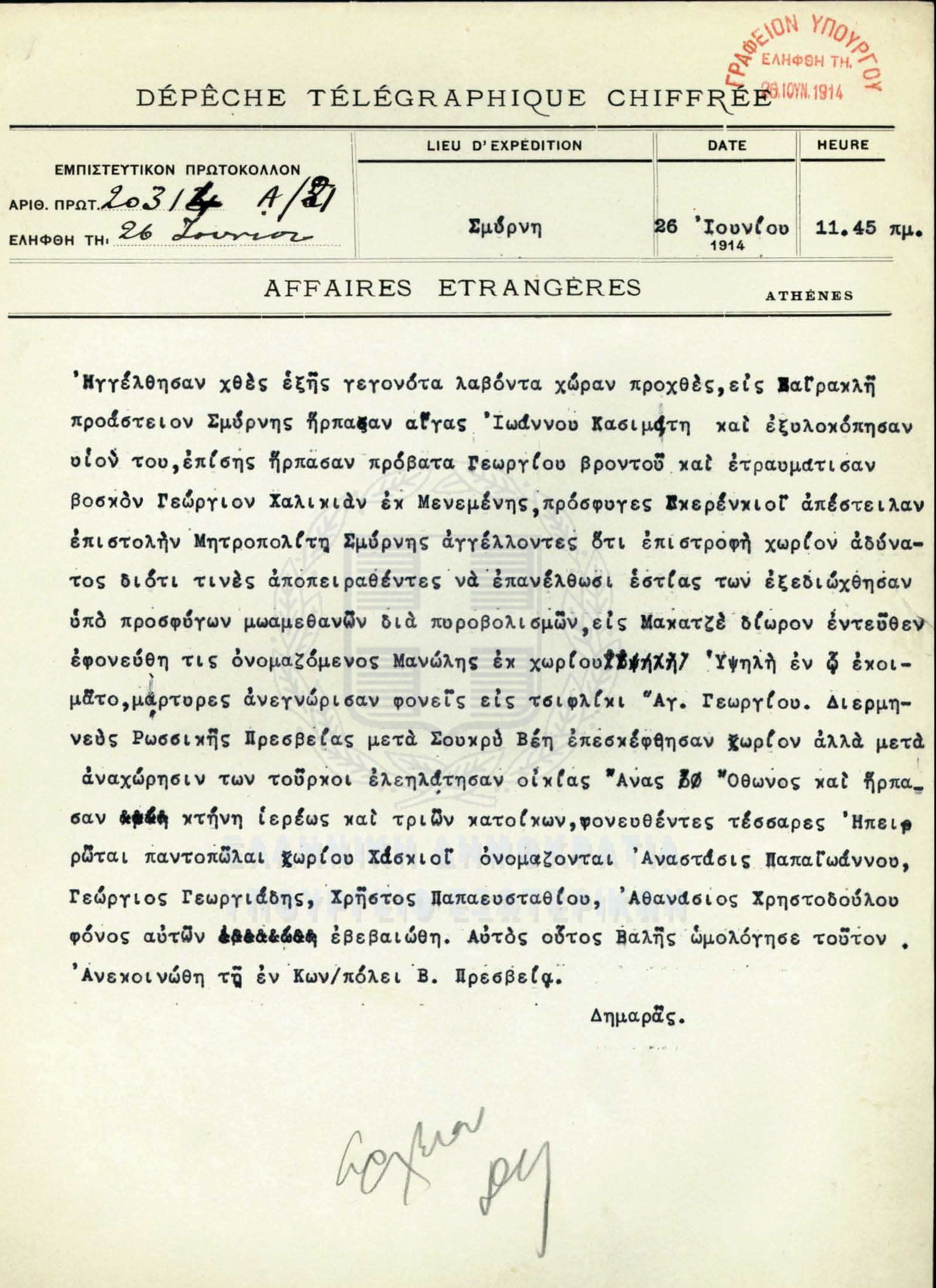
FROM: Consul General Dimaras, Smyrna
TO: Greek MFA, Athens; Royal Greek Embassy, Istanbul
AFFECTED AREAS: İzmir, Gerenköy, Menemen
Smyrna, 26 June (9 July) 1914
The following events took place the day before yesterday and became known to us yesterday:
In Zeyrekli, a suburb of Smyrna, they stole the goats of Ioannis Kasimatis and beat up his son. They also took the sheep of Georgios Vrontos and injured the shepherd Georgios Halikias from Menemen. Refugees from Gerenköy sent a letter to the Metropolitan Bishop of Smyrna informing him that returning to their village was impossible because anyone who tried to go back home was chased away by Muslim refugees shooting rifles.
In Makace, two hours away, they killed a man called Manolis from the village of Ypsili, whilst he was asleep. Eye-witnesses identified the murderers in the Aya Yiorgi çiftlik.
The Interpreter of the Russian Embassy visited the village together with Şükrü Bey, but right after they departed, the Turks looted the home of Anna Othonos and stole the priest’s and three more inhabitants’ animals. In the village of Hasköy, four murdered grocers from Epirus, in Greece, have been identified: Anastasis Papaioannou, Georgios Georgiadis, Christos Papaefstathiou, Athanasios Christodoulou. Their murder has been verified. Even the Valı himself confessed to it.
CC: Royal Greek Embassy, Constantinople
[Dimaras]
scroll down for english translation

FROM: Vice-Consul Panagopoulos, Manisa
TO: Greek MFA, Athens; Royal Greek Embassy, Istanbul
AFFECTED AREAS: İzmir, Manisa
Manisa, 28 June (11 July) 1914
The Valı of Smyrna came here yesterday and assured the Church Warden that he is touring the area in order to issue explicit orders in person so that the commercial blockade stops immediately. But there is still no safety. Last night, two Rum shepherds were killed close to Manisa by people unknown.
[Panagopoulos]
scroll down for english translation

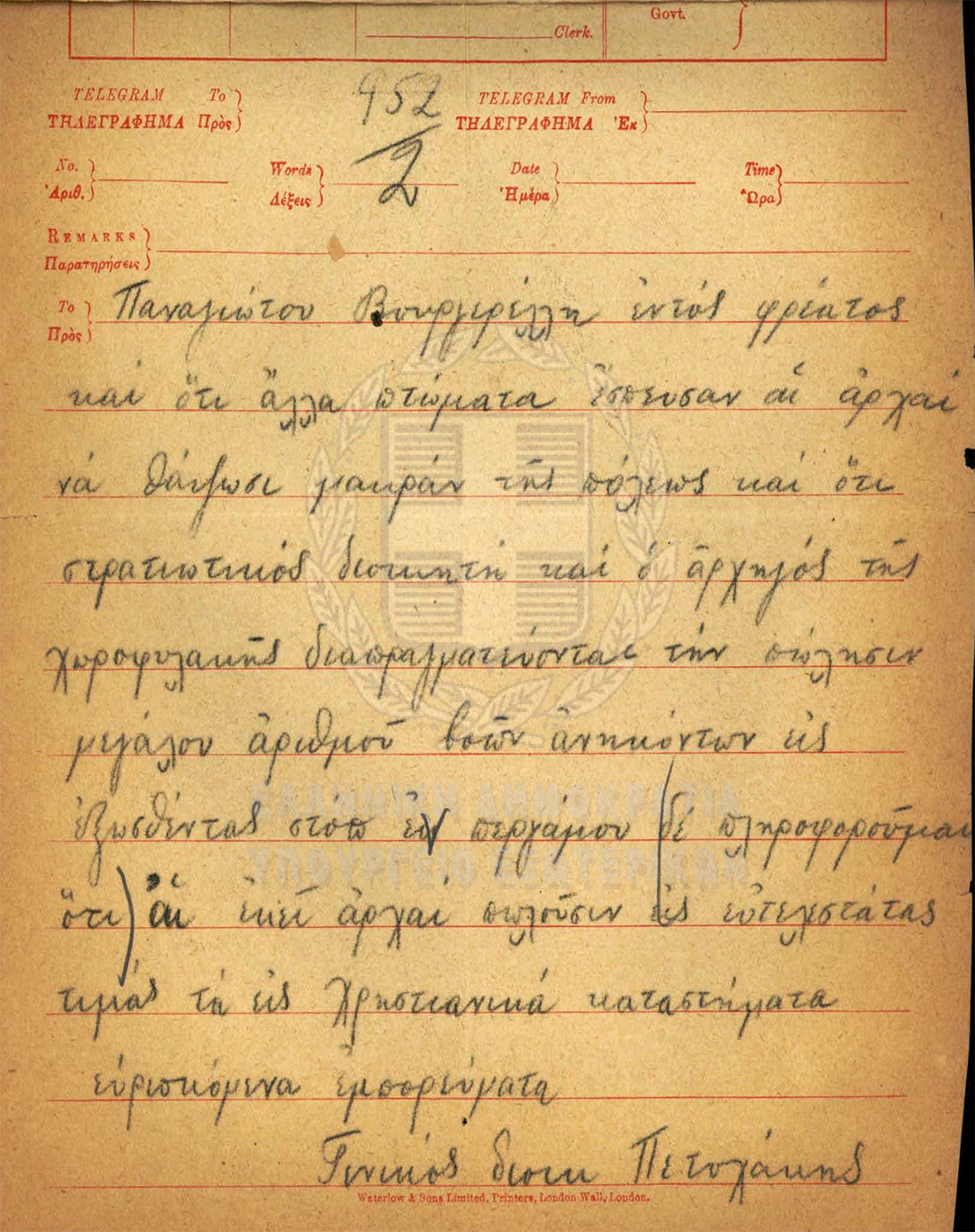
FROM: Governor General Petychakis, Mytilene
TO: Greek MFA, Athens
AFFECTED AREAS: Ayvalık, Kabakum, Balıkesir, Bergama
TELEGRAM FROM MYTILENE
30 June [13 July] 1914
Recipients: 2
Prime Minister / Minister of Internal Affairs
Our other deputy consul in Ayvalık informs me that in Kabakum Turkish refugees have been installed in the houses of Greeks, that Greek estates and fields are being handed over to the raiders, that most of the stolen animals have already been transported, some to Smyrna some to Balıkesir, that in between Ayvalık and Buradelli they found the dead body of Panayiotis Vurgerelis inside a well, and that other bodies the Authorities were quick to bury far from the city. And that the local army chief and the commander of the gendarmerie have been negotiating to sell a large number of oxen belonging to the displaced. STOP. In Bergama, I am informed, the Authorities are selling all goods found in Christian shops for a pittance.
[Governor General Petychakis]
ΤΗΛΕΓΡΑΦΗΜΑ εκ Μυτιλήνης
30 Ιουνίου [13 Ιουλίου] 1914
Αποδέκται: 2
Πρωθυπουργόν / Υπουργόν Εξωτερικών
Ημέτερος υποπρόξενος Κυδωνιών με πληροφορεί ότι και εις Καβακήμ εγκατεστάθησαν τούρκοι πρόσφυγες εις οικίας Ελλήνων, ότι Ελληνικά κτήματα παραχωρούνται υπό των αρχών εις επιδρομείς, πλείστων δε διαρπαγέντων ζώων δημευθέντα μετεφέρθησαν ήδη, άλλα εις Σμύρνη και άλλα εις Μπαλουκεσίρ / ότι μεταξύ Κυδωνίων και Μπουραντελί ανευρέθη το πτώμα Παναγιώτου Βουργερέλλη εντός φρέατος και ότι άλλα πτώματα έσπευσαν αι αρχαί να θάψωσι μακράν της πόλεως. Και ότι στρατιωτικός διοικητής και ο αρχηγός της χωροφυλακής διαπραγματεύονται την πώλησιν μεγάλου αριθμού βοών ανηκόντων εις εξωσθέντας ΣΤΟΠ
Εν Περγάμω, δε, πληροφορούμαι ότι αι εκεί αρχαί πωλούσιν εις ευτελεστάτας τιμάς τα εις Χριστιανικά καταστήματα ευρισκόμενα εμπορεύματα.
Γενικός Διοικητής Πετυχάκης







Phocaea 1914
Eye Witness
Testimonies
Newspaper
Archives
Greek MFA
Telegrams
Political
Background